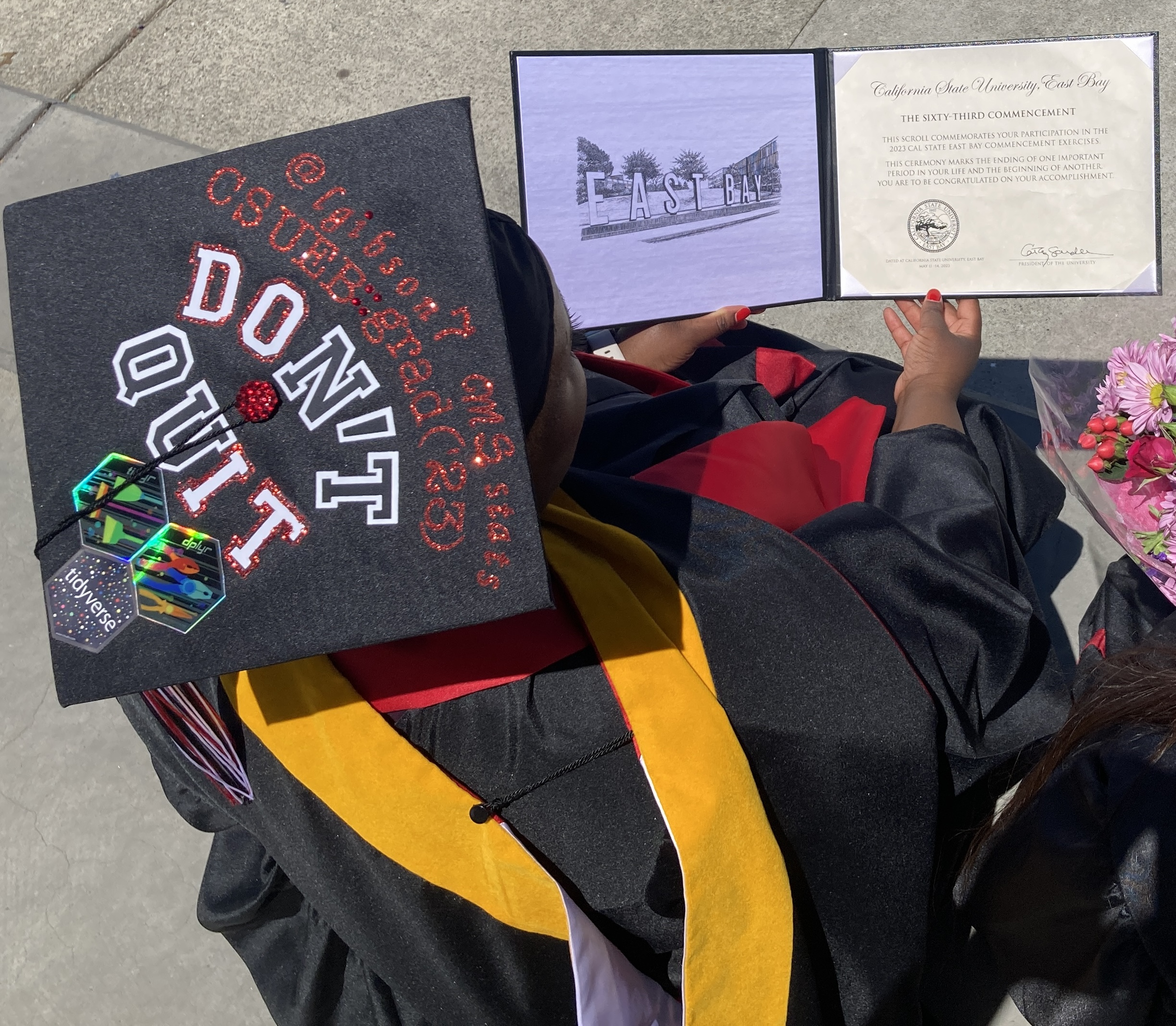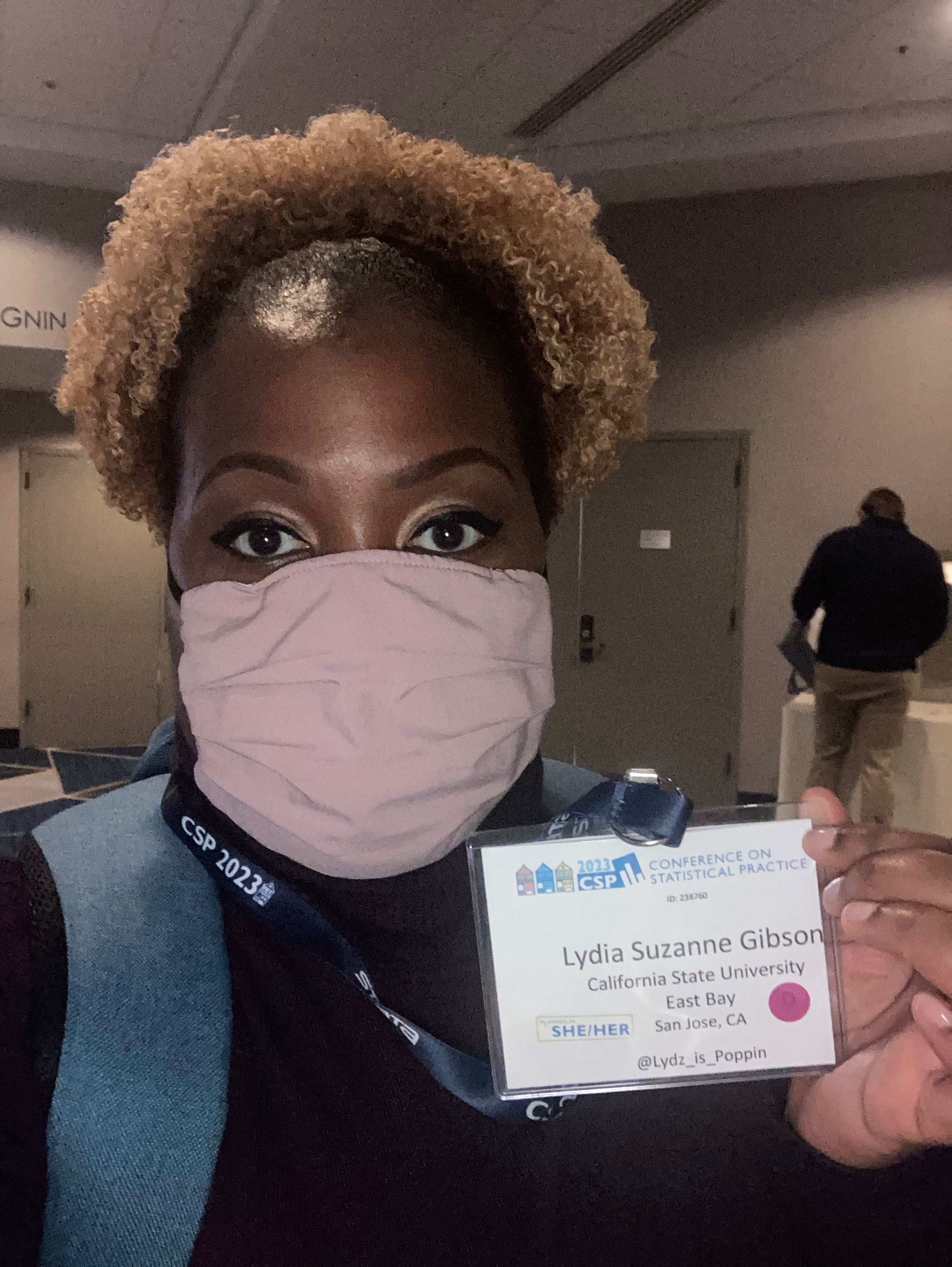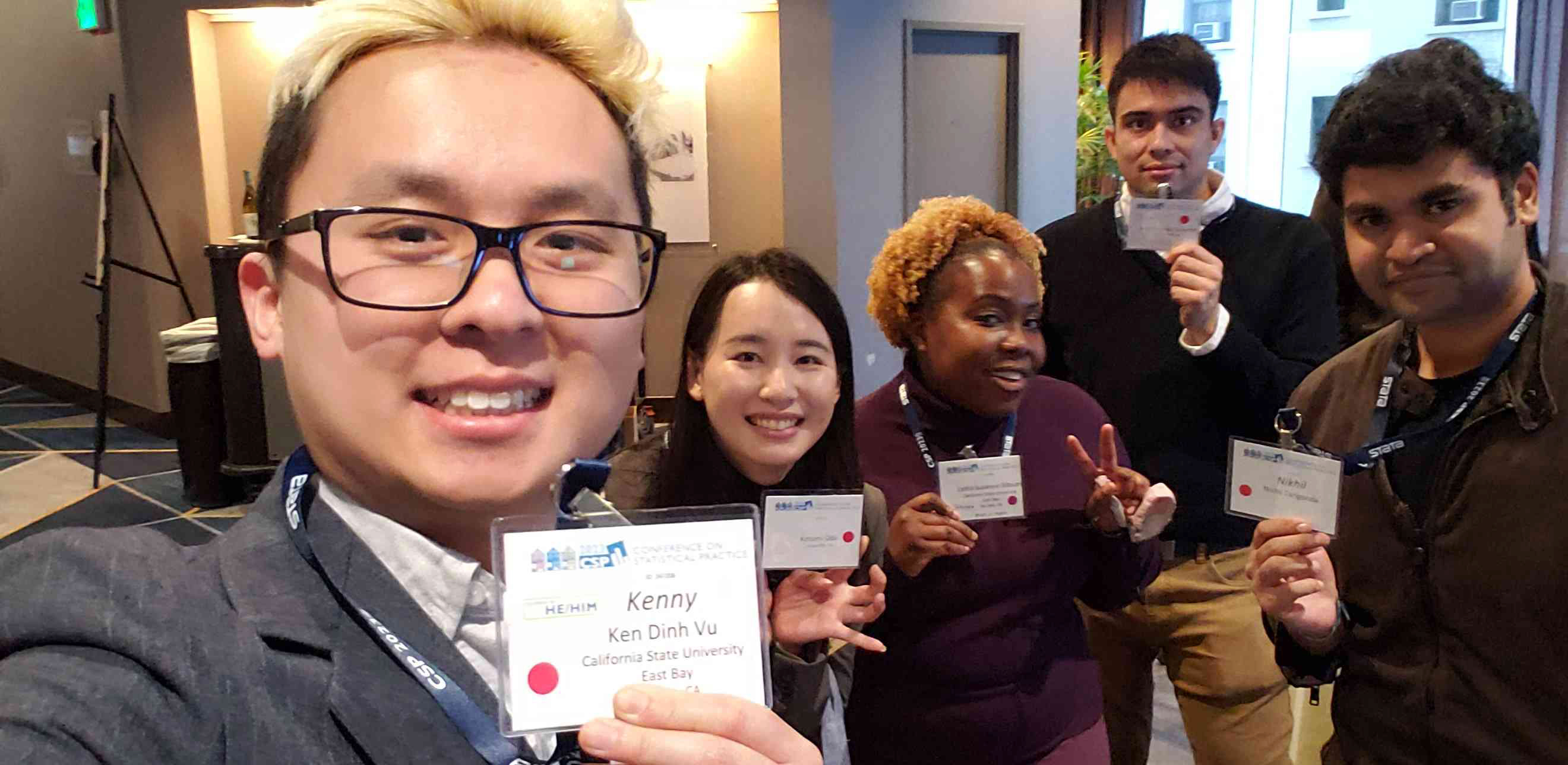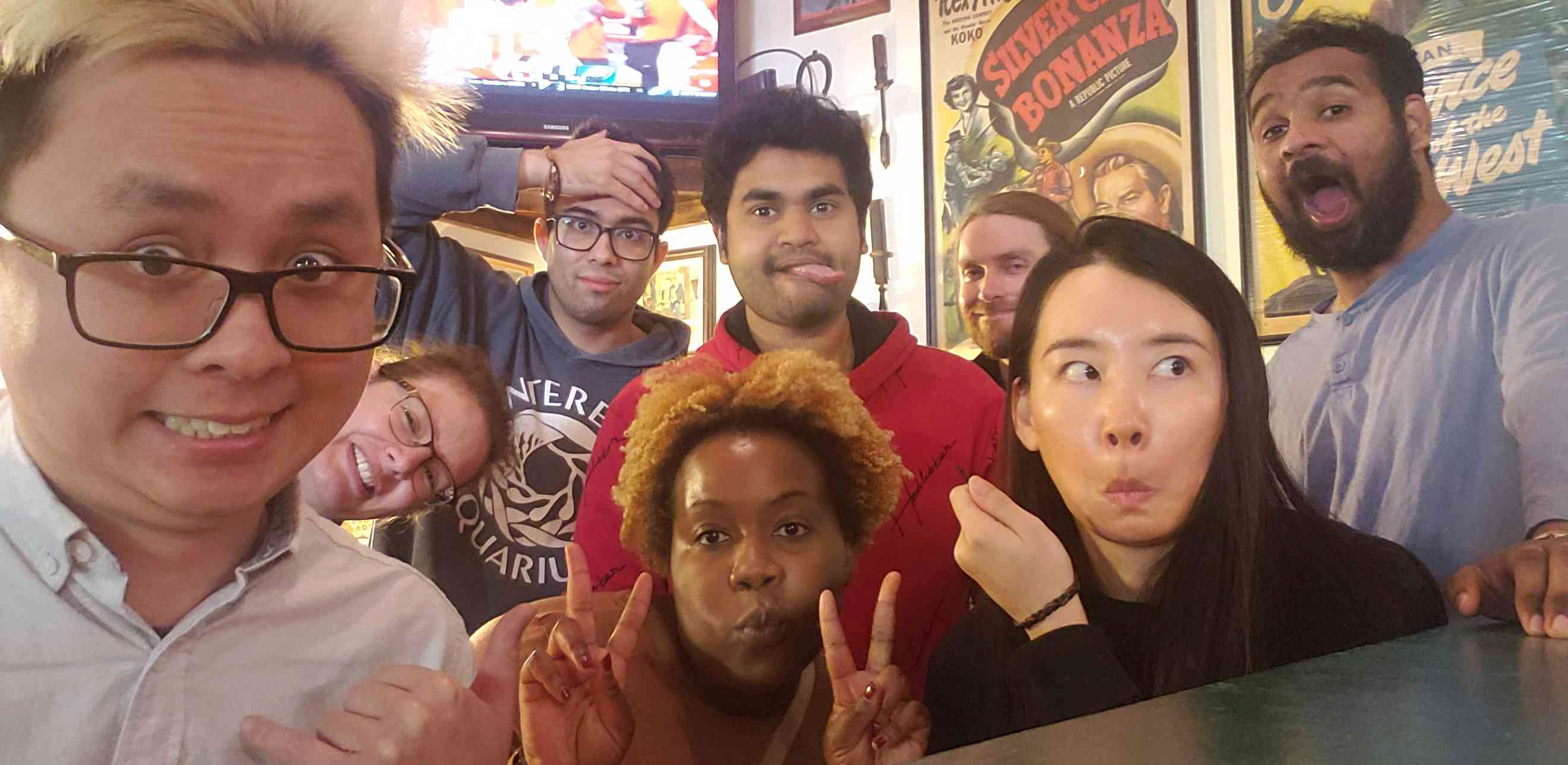Attending CSU East Bay wasn’t my first time attempting grad school. The first time wasn’t a success, but I didn’t quit. Now, I’m Lydia Suzanne Gibson, MS.
When Things go wrong, as they sometimes will,
When the road you’re trudging seems all uphill,
When the funds are low and debts are high,
And you want to Smile but have to sigh.
When care is pressing you down a bit,
Rest, if you must, but don’t you quit.
Excerpted from Don’t Quit by Edgar A. Guest

This past May, I graduated with my Master’s in Statistics from California State University East Bay (CSUEB) with a 3.9 GPA. If you’ve read my blog before, you may or may not recall me briefly mentioning that this degree program was not my first attempt at pursuing graduate education. In the Spring of 2016, I applied for and was accepted to the one-year accelerated MS Accountancy program at San Jose State University (SJSU). That summer, with only one prerequisite course left in the series of five that I needed to begin the degree program, I dropped out.
Ever since graduating this Spring, and honestly all the while I’d been attempting the degree program at CSUEB, I’ve been reflecting on what made this go-round at pursuing my Master’s different from the last. Is statistics easier than accountancy? Well depending on how you feel about doing your own taxes, and even if you have no thought on the matter, it’s a moot point. The programs and fields are totally different, but I believe there are some guiding principles that I learned along the way that could also help you, the reader, through grad school.
Pace Yourself
When I applied for the program at SJSU, I was only interested in making more money ASAP. At the time, I was working part-time (~20 hrs/wk) as a Sales Associate at Macy’s Valley Fair in Santa Clara, CA making around $13/hr. That placed me barely above the poverty line for the United States as a whole, but if you know anything about the cost of living in the San Francisco Bay Area, as a single 26 year old tax-paying adult, I was in poverty for all intents and purposes. Although I had, and still have, the support of my family, I felt a sense of urgency to be able to be completely financially self-sufficient, so I went for an accelerated degree program that would get me closer towards a well-paying career in the least amount of time possible. What a mistake that was!
As a by-product of completing a minor in Business Administration during my undergraduate studies, I’d already been familiar with accounting, having aced both financial and corporate accounting on my first attempts. Besides that, I hadn’t taken any other collegel-level accounting courses but being a cocky 20-something with a “how hard could it be?” mentality, I figured the MS Accountancy program at SJSU would be a piece of cake. Boy was I wrong! I don’t think I truly understood just how grueling taking five 4 hrs/day, 4 days/wk, back-to-back two and a half week sequential prerequisite summer courses would be. To say it had me stressed out of my mind was an understatement.
When I started my program at CSUEB, I knew I’d do myself a disservice trying to speed through the degree, and that I needed to take things slow this time around. While the MS Statistics degree is generally a two-year degree, it can be finished in one and a half years if you complete some of the second-year electives in your first-year alongside the core courses. While I have a love for mathematics, especially that feeling of cracking the code and finally solving a puzzle, I didn’t have much recent practice beyond general arithmetic, and a Master’s in Statistics requires a strong grasp of algebra and calculus, as well as some knowledge of linear algebra. Also, as you recall from previous posts, my R and general programming skills were non-existent prior to starting my degree program, so all I’d be doing was setting myself up to fail if I tried to go too fast.
In the end, I’m very happy with my decision to take the program at the suggested completion speed of two years as it allowed me to spend time participating in vital career development activities such as networking events, resume writing and mock interview workshops, and attending statistics-related webinars. It also allowed me to keep myself more mentally, physically, and emotionally healthy, as I didn’t have to spend all-nighters trying to complete endless assignments and I had time to just hang out and relax with my friends without worrying that I wasn’t not making the most practical use of my time.



Ask for Assistance
Over 25% of adults in the United States have some type of disability that affects the way they live and work, and I’m one of them. In the US, the Americans with Disabilities Act (ADA) protects individuals like myself from discrimination in the workplace, at school, and various other settings. One such protection is the right to receive educational accommodations. Depending on your specific disability, you may be able to receive accommodations from your institution which puts you on equal footing with your peers and provides you the necessary assistance to fit your specific accessibility needs.
Fresh out of high school, I completed the requirements for my undergraduate degree in three and a half years without the need of any accommodations, so it had never occurred to me that I may have needed them when I first attempted a Master’s degree just five years later. By the time I had attempted the MS Accountancy program at SJSU, I’d been dealing with bouts of clinical depression and generalized anxiety for a few years. Depression and other sorts of mental illnesses tend to be considered ‘invisible disabilities’, but they come with very real and apparent symptoms that affect one’s ability to successfully complete a degree program, i.e. difficulty concentrating, low motivation, memory problems, and other cognitive impairments.
If you haven’t had accommodations before, it can feel like you’re just asking for special treatment, but I honestly could not have completed my degree without them. I tend to be a very diligent student, but missing deadlines and low exam scores were what tripped me up in the end at SJSU. Prior to the start of the summer prerequisite courses for the MS Accountancy, I had just ended a relationship and lost a loved one, and it sent me into a depressive spiral. If I had accommodations in place, perhaps I may have been able to receive the necessary assistance to complete my coursework and continue on in that degree program.
When I began my degree program at CSUEB, one of the first things I did was seek out the Accessibility Services department (it may be called something different at your school) to request accommodations. One of the accommodations I started off with was an extension of deadlines when necessary, but I later learned that I also benefited from completing my exams in the Accessibility Services office instead of in the classroom with my peers because it provided an environment with far less distractions. Asking for educational accommodations can feel embarrassing, but you should never be embarrassed to ask for help when you need it.
It Takes a Village
On the first day of classes, my Probability and Statistics Theory professor suggested that the other students and I form study groups to work on practice problems together outside of class. Later that evening, I sent out a message to all my classmates through Blackboard and asked if anyone would be interested in forming an in-person study group in the South Bay. For those unfamiliar with the San Francisco Bay Area, the South Bay consists largely of San Jose – where I lived – and other smaller cities, while the East Bay, which you could probably guess is east of the San Francisco Bay, is northeast of the South Bay, with the CSU East Bay campus being a 35-50 minute drive from where I lived, depending on traffic. Luckily for me, there were several other students living in the South Bay with even longer commutes than me that were interested in having an in-person study group close to home.
Over the course of that semester, a handful of us met regularly twice a week on the days we didn’t have classes, and prepped for the quizzes and exams for the two classes we were all taking with one another. Over time, we’d grab food together before or after our study sessions, we got to know one another better, and eventually we started hanging out without any plans to study at all. As others noticed the strong bond and friendship we were growing, more folks from our class joined our study group and/or our non-school related hangouts. By the end of that semester, we’d gone to the movies to see Venom II, went to Dave & Buster’s for Halloween, went to a bar one morning to watch a soccer match between Arsenal and Manchester United, and went to Christmas in the Park in Downtown San Jose. Throughout the next three semesters, our bonds continued to grow and our friend group grew.
Without a doubt, the friends I made at CSUEB are one of the biggest reasons that I was able to make it through my degree program. I can honestly say that I’ve gained more than a handful of good solid friendships that will last me the rest of my life. These friends started out as my classmates, became members of my study group, and now we’re all like a family. Like any other family, we support one another through life’s ups and downs. There were times during my degree program when my depression and anxiety were getting the best of me, but I knew I could always rely on my classmates, who are now my dear friends, to support me. Besides earning my degree, I think the best thing to come from attending the Master’s program at CSUEB is the friendships that I made along the way.



Final Reflections
Well dear reader, there you have it. My keys to successfully completing a graduate degree: take things slow, get help when you need it, and find your people. Completing a graduate degree is not a race, so if possible, take it slow so that you can make use of the other resources your university has to offer, such as career services, or any other perks that come with your coveted .edu email address. The reason you’re in school is to ‘get help’ from your professors in learning the necessary tools to succeed in your chosen trade, so don’t be shy in asking for any other help that you may need, be it accommodations for your accessibility needs or even just going to office hours for help with homework and classwork. Lastly, none of us live or work in isolation, so it’s good to build a community and support system among you and your classmates so you don’t have to navigate your journey alone – you might even end up with friendships that’ll last well beyond graduation.
